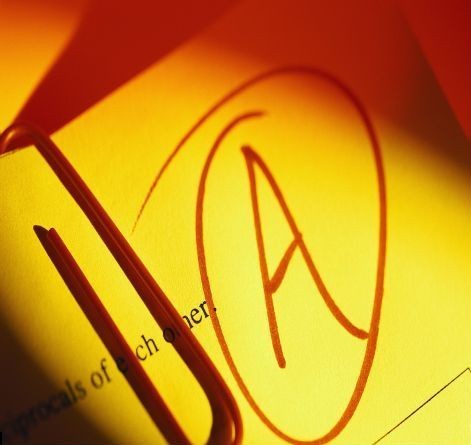BFTP: Beware the straight-A student
 Sunday, May 15, 2016 at 05:17AM
Sunday, May 15, 2016 at 05:17AM  When visiting my daughter this past weekend, she reminded me that while she was in high school that I would give her five dollars for each A on her report card, but ten dollars for every B.* And she knew why.
When visiting my daughter this past weekend, she reminded me that while she was in high school that I would give her five dollars for each A on her report card, but ten dollars for every B.* And she knew why.
I'd encountered people who, after an unbroken string of A's in high school, suddenly got a B or C in college and fell apart. Knowing how to handle academic stumbling blocks - that teacher who just can't be satisfied, that concept beyond one's comprehension, that unreasonable assignment - is as critical to one's education as knowing the quadratic equation or how to honor parallel construction in one's writing.
My plan didn't work with my daughter. She still wound up with something close to 4.0 GPA and still handled her college and grad classes just fine. So much for that theory.
But here is another concern I have about stratight-A students: Are they demonstrating, not intelligence, but the ability to conform, to mindessly follow instructions, to support the established order? Do truly orginal thinkers and creative problem-solvers get high grades in school?
So here's the consequence: what happens when our straight-A students become educational leaders - principals, directors, even superintendents? 500 years ago Machiavelli wrote:
"... it ought to be remembered that there is nothing more difficult to take in hand, more perilous to conduct, or more uncertain in its success, than to take the lead in the introduction of a new order of things. Because the innovator has for enemies all those who have done well under the old conditions, and lukewarm defenders in those who may do well under the new."
The underlining is mine. Why would anyone want to change a system that has so handsomely rewarded the deserving - oneself?
Perhaps we need need to put the folks who were C and D students, the drop-outs, the poor test takers, pains-in-the-butt, the artists and rabblerousers in charge of the schools for a while. Maybe we'd see some change.
Or perhaps we should start giving A's for something other than good test performance. What a concept.
Beware the straight-A student leader.
*Yes, this is a part of my nomination for the title Worst Parent Ever.
See also The Good Girls/Good Boys Club post









Reader Comments (3)
Right on the button - I personally ended high school with a 2.78 GPA, but then had at least a 3.75 during all of my college years...but I still was not a straight A student.
My personal opinion is that many straight A students see high school as "pre-college" and are primarily concerned with the letter grade and not the subject material. I talk to students all the time about which AP classes they are going to take. Rarely do I hear (I really like history so I am taking AP US History" - I more likely hear "Which AP classes are easier?"
One of the most difficult discussions to have with my high school students is letting them know that grades are not everything. But I will continue anyway...
Hi Kenn,
Your grades sound like mine in HS and college. I am not sure I even had a 2.78 in HS though. (I like to tell my kids I graduated in the upper 90% of my class.)
Too bad we don't recognize the difference between earning a grade and learning for life.
All the best,
Doug
What does an "A" truly represent? What do the number and the "point" in a 4.0 really mean? I have asked those in higher education this question, "What are you going to do with all those "A's"? How will they add meaning to your life?" and no can can give a suitable answer. I'm fortunate to be teaching in a graduate program that gives narrative assessment evaluations at the end of a course. Yes, they are much more work than giving a letter or number grade. But the assessment actually means something. Here's the rub: we are continually badgered by the accreditation cycle to provide more quantifiable evidence of learning. They don't want to read deeply-thoughtful papers, they want numbers. It is a conundrum.